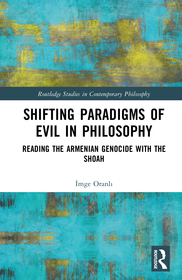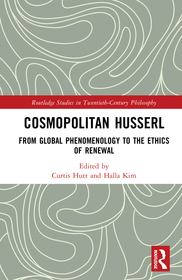
Shifting Paradigms of Evil in Philosophy
Reading the Armenian Genocide with the Shoah
Sorozatcím: Routledge Studies in Contemporary Philosophy;
-
10% KEDVEZMÉNY?
- A kedvezmény csak az 'Értesítés a kedvenc témákról' hírlevelünk címzettjeinek rendeléseire érvényes.
- Kiadói listaár GBP 145.00
-
69 273 Ft (65 975 Ft + 5% áfa)
Az ár azért becsült, mert a rendelés pillanatában nem lehet pontosan tudni, hogy a beérkezéskor milyen lesz a forint árfolyama az adott termék eredeti devizájához képest. Ha a forint romlana, kissé többet, ha javulna, kissé kevesebbet kell majd fizetnie.
- Kedvezmény(ek) 10% (cc. 6 927 Ft off)
- Kedvezményes ár 62 346 Ft (59 378 Ft + 5% áfa)
Iratkozzon fel most és részesüljön kedvezőbb árainkból!
Feliratkozom
69 273 Ft

Beszerezhetőség
Becsült beszerzési idő: A Prosperónál jelenleg nincsen raktáron, de a kiadónál igen. Beszerzés kb. 3-5 hét..
A Prosperónál jelenleg nincsen raktáron.
Why don't you give exact delivery time?
A beszerzés időigényét az eddigi tapasztalatokra alapozva adjuk meg. Azért becsült, mert a terméket külföldről hozzuk be, így a kiadó kiszolgálásának pillanatnyi gyorsaságától is függ. A megadottnál gyorsabb és lassabb szállítás is elképzelhető, de mindent megteszünk, hogy Ön a lehető leghamarabb jusson hozzá a termékhez.
A termék adatai:
- Kiadás sorszáma 1
- Kiadó Routledge
- Megjelenés dátuma 2025. szeptember 28.
- ISBN 9781041052692
- Kötéstípus Keménykötés
- Terjedelem182 oldal
- Méret 229x152 mm
- Súly 500 g
- Nyelv angol 699
Kategóriák
Rövid leírás:
This book develops an interdisciplinary framework rooted in philosophy for addressing political evils experienced around the world. Drawing on resources from Continental philosophy and historical studies, it argues for the relationality and continuity between political evils, using the Armenian Genocide and the Shoah as examples.
Több
Hosszú leírás:
This book develops an interdisciplinary framework rooted in philosophy for addressing the political evils experienced around the world. Drawing on resources mainly from philosophy and historical studies, it argues for the relationality and continuity between political evils, using the Armenian Genocide and the Shoah as main examples.
The book begins by unpacking a series of limiting assumptions that define the philosophical study of evil. These assumptions crystallize in the idea that evil is an inscrutable phenomenon, what the author calls the paradigm of evil’s inscrutability. Tracing this paradigm through the legacies of five key philosophers—Plato, Augustine, Kant, Arendt, and Levinas—the author shows that by the time we arrive at 20th century, the framing of political evils like the Shoah as inscrutable and exceptional is profoundly constraining; it erases Shaoh's continuity and connection with other atrocities, including the 1915 Armenian Genocide. The book next turns to practices and ideologies that connect the Armenian Genocide to the Shoah to propose an alternative paradigm for thinking about evil: a paradigm of the continuity of evils. Offering this paradigm to readers in philosophy and adjacent disciplines, the author explores the relationality between the Armenian Genocide and the Shoah, but also between Turkish genocide denialism and a contemporary case of racist evildoing against Armenians in Turkey, shifting the discussion of political evil in a direction that aims to turn overlooked evils around the world into objects of philosophical thinking.
Shifting Paradigms of Evil in Philosophy will appeal to researchers and graduate students working in Continental philosophy, social and political philosophy, history of philosophy, ethics, political theory, genocide studies, and Holocaust studies.
TöbbTartalomjegyzék:
Introduction 1. The Origins of Evil’s Inscrutability: Plato, Augustine, and Kant 2. Inscrutable Evil in Continental Philosophy: Arendt and Levinas 3. Continuity of Evils: The Armenian Genocide and the Shoah 4. An Alternative Reading of Banality of Evil: The Armenian Genocide and Dr. Mehmed Reshid 5. The Non-Recognition of an Atrocity and The Evils of Turkish Genocide Denialism Conclusion
Több





